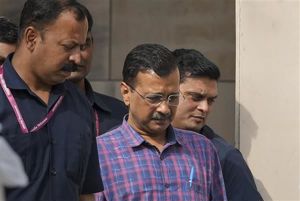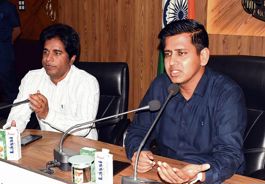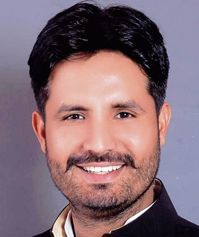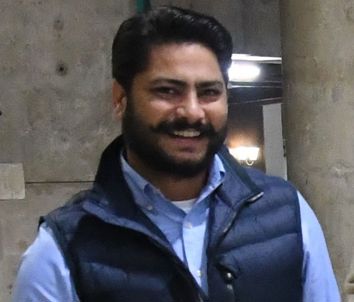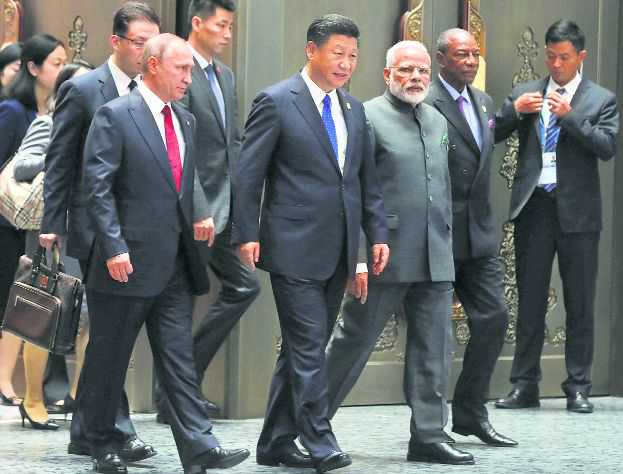
In step: India can’t be seen as a US pawn against Russia, or China.
Vivek Katju
Ex-secretary, Ministry of External Affairs
The 19th India-Russia annual summit on October 4-5 attracted greater attention than its previous recent editions. On the agenda were issues that profile the fundamental dilemma that confronts Indian foreign policy today: how does the country navigate the bilateral and triangular, current and emerging, relationships between the US, Russia and China? In focus was India’s proposed acquisition of Russia’s S-400 missile defence system. Some US officials had warned that the purchase may attract sanctions mandated in the Russia, Iran and North Korea-centric CAATSA. The decision on the S-400 system was therefore being considered an indication of PM Modi’s willingness to continue to chart an independent foreign policy course.
Modi resolved to go ahead with the purchase. Clearly, he refused to accept the curtailment of India’s options or an abridgement of its choices on account of the internecine problems of foreign powers. Modi’s predecessors, beginning with Nehru, had followed the same impulses, though it is unlikely that it will be so acknowledged in these politically contentious times. Foreign policy in the essentially bipolar Cold War era was complex, but it is more so now when power equations are in flux and the rules governing global order under challenge. Modi’s task is more difficult as these enormous international developments are occurring when India is assuming global power status amid pervasive domestic ideological contestation and socio-economic change.
The US remains and will continue to be the pre-eminent power. Despite Trump’s America First approach, India has much to gain from Indo-US ties moving positively ahead. Under Xi Jinping, China is now assertive and impatient with global rules or the sensitivities of other states, including India, if they stand in its way to greater global authority. It is increasingly considering itself as the main challenger of the US. While there are areas of cooperation, the competitive elements of the Sino-Indian relationship and unresolved disputes cannot be wished away. Russia continues to be a major strategic and military power and retains a demonstrated capability to influence global developments. India’s need of Russia, especially in defence and security, will continue to be substantial. Significantly, China and Russia are acting in tandem in some areas to resist the US. This is the geopolitical landscape through which India needs to steer its diplomacy to secure its interests.
In a candid and the Trump administration’s first elaborate China policy speech on October 4, Vice-President Pence asserted US determination to combat Chinese commercial and geo-strategic challenge to its pre-eminence. Clearly, the US now considers China as its principal rival and is signalling that it will act against it where necessary; it has done so on the trade front. In containing China, it is looking to shore up its constituency by bringing India into its fold. It is here that Modi has to decide to what extent should India go with the China containment agenda, even as it seeks a closer and comprehensive bilateral relationship.
Till now Modi has signalled to China that despite the border issue and other bilateral irritants, India will not become an open territory for the US in its quest to contain China. Implicit in this approach is the need for China not to heat up the border through Doklam-like moves, to show sensitivity to Indian concerns, as on NSG membership and permanent membership of the UNSC, Pakistan’s sponsorship of terrorism, and to refrain from being too aggressive in India’s immediate neighbourhood. The question is, the Wuhan summit spirit notwithstanding, how far can China accommodate Indian interests as it pursues its global and regional interests? Apart from the transformation of Sino-Pakistan ties because of CPEC, the Maldives case tested India’s patience. Chinese moves in Nepal and Sri Lanka cannot but cause wariness in India, which has not publicly articulated the red lines. A case can be made out for it to do so.
Growing US-India defence ties, and for this purpose its acceptance of the foundational agreements, although tweaked, indicate closer bilateral relations and not an Indian willingness to go along with the US agenda, where it diverges from its interests. Modi’s differentiated approaches to Central Asia and the Indo-Pacific region are illustrative. India has joined the Shanghai Cooperation Council, one of China and Russia’s instruments to keep the US out of Central Asia. At the same time, it is developing bilateral partnerships with Japan and is increasingly comfortable with multilateral arrangements in the Indo-Pacific that seek to provide a bulwark against China’s expansionist tendencies.
India’s defence ties with Russia is time-tested. Modi has signalled that it will continue. The unstated implication is that if CAATSA is invoked, India-US ties will have to bear an inevitable burden. Wisdom will lie in the US giving a waiver for an augmentation of Indian defence capabilities against China. Trump may require something in return and a negotiation may have to take place. A similar negotiation in respect of Iran on oil may be more difficult than on connectivity through Chabahar. As the US becomes an outlier on some global issues, including climate change, it is inevitable that Indian approaches on these will become more aligned with Russia and China. However, these aspects are unlikely to impact India-US ties.
Modi’s grand strategy seems to be to develop comprehensive ties with the US, sustain the Russia relationship and maintain a balanced approach to China. The last will be the most difficult. It will test Indian diplomacy as the three powers whirl and dance.
























